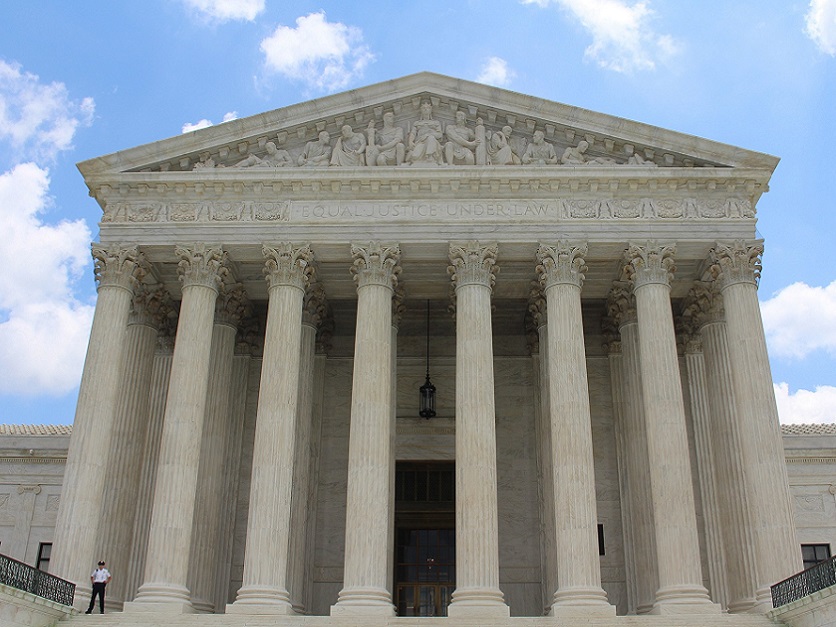The Supreme Court is poised to upend a long-standing legal doctrine that industry critics say gives federal agencies too much power to interpret the laws passed by Congress.
At issue is the future of Chevron deference, a four-decade-old doctrine that arose from a series of cases examining EPA clean air regulations. Under the doctrine, courts must — when interpreting federal regulations — first examine the wording of the law or statute. If that is not clear enough, then the courts should defer to an agency or agencies’ reasonable interpretation.
Dozens of groups representing a wide range of interests, including agricultural businesses, have weighed in with briefs in a case taken up by the court in May, Loper Bright v. Raimondo, and likely to be argued in January. Another case raising essentially the same question was accepted by the court Monday, apparently in an effort to ensure participation by the full court, since Justice Ketanji Brown Jackson had recused herself from participating in Loper Bright.
The case was argued at the D.C. Circuit Court while she was on the slate of judges there; though she was not on the panel that heard testimony on the case and did not contribute to the lower court's opinion, Supreme Court precedent often leads justices to recuse themselves from cases argued before them previously.
Loper Bright concerns whether the National Marine Fisheries Service ran afoul of Chevron when it issued regulations requiring fishing companies to pay for observers on their vessels.
“You have a fisherman who's now being forced to pay for regulators … to make sure he's not breaking the law,” said Travis Cushman, deputy general counsel for the American Farm Bureau Federation. Although the law does not require payment by the fishing company, Loper Bright Enterprises, the District of Columbia Circuit Court of Appeals found it was ambiguous under Chevron.
 Travis Cushman, Farm Bureau
Travis Cushman, Farm BureauChevron has been on shaky ground for years. Some current justices, perhaps most notably Neil Gorsuch, have said it’s time to bury it, and Cushman says that by failing to cite the doctrine in decisions, the court has effectively signaled that agencies should not rely on it. Justices Clarence Thomas and Brett Kavanaugh have also criticized it for giving too much power to federal regulators, and Cushman said the court has ignored it in decisions in recent years.
“I think there is an appetite on the court” to get rid of it, Cushman said.
In a brief, AFBF and seven other groups, including the Agricultural Retailers Association, National Cattlemen’s Beef Association, National Pork Producers Council and the North American Meat Institute, argue “a deference rule, as experience shows, makes it far too easy for agencies and courts to throw up their hands when faced with difficult statutory language and rely on deference rather than careful textual analysis.”
The Supreme Court “has already made great strides in curtailing agency overreach and restoring the separation of powers by reinvigorating the ‘major questions doctrine,’” the groups said, as when the court found EPA had exceeded its authority in setting greenhouse gas emissions rules for power plants.
“But most agency errors are more mundane, involving misreadings of or insufficient attention to statutory text, not the unauthorized determination of major policy questions,” the groups said. “In those more run-of-the-mill cases the Chevron doctrine continues to endorse unwarranted agency interpretations not intended by Congress.”
It’s easy to be “in the know” about what’s happening in Washington, D.C. Sign up for a FREE month of Agri-Pulse news! Simply click here.
But in a brief supporting the government, eight law professors who specialize in administrative law and federal regulation said, “Congress understands that by entrusting an agency to carry out a statute, and by leaving that statute indeterminate in certain respects, it is calling on the agency to fill in the details with policy choices consistent with the statute as a whole (and other applicable law).”
“The implications of an over-scrupulous insistence that the executive undertake no statutory interpretation whatsoever would be troubling,” the academics added. “To take one example, Congress would have to determine in advance the rates that would apply to utility pole attachments, or perhaps courts would have to decide whether specific rates count as ‘just and reasonable.’”
The Natural Resources Defense Council, which litigated the cases that led to the 1984 decision in Chevron v. NRDC, said in its brief that the absence of the doctrine might lead to it winning more cases than it loses. Nevertheless, NRDC argued for its continued use.
NRDC said with agencies and courts being forced to deal with increasingly complex issues, those agencies need to have the freedom to interpret congressional intent.
In addition, “deference helps restrain judges from substituting their policy judgments for those of the more accountable political branches,” NRDC said. “In this way, deference also promotes legal uniformity by preventing courts from reaching disparate conclusions based on their own preferred constructions of a statute.”
“As the judicial appointments process has become increasingly partisan, the range of … judges’ views has gotten even wider,” NRDC communications specialist Jeff Turrentine said in an article on Chevron. “Ending Chevron deference would be tantamount to throwing a dart at a lower-court dartboard … and hoping for the best.”
Another petition before the high court could benefit from a decision in Loper Bright repealing Chevron. South Dakota farmer Arlen Foster has asked the court to review an 8th Circuit Court of Appeals decision that ruled the Natural Resources Conservation Service did not have to grant him a review of its Swampbuster determination that less than an acre of his land is wetlands.
In addition to raising questions of statutory interpretation, the petition seeks the overturning of Chevron.
Cushman said the court could simply hold off on Foster's case until it issues a decision in Loper Bright, and then send the case back down to the 8th Circuit. Or, it could consider the Swampbuster case on its own merits.
“We think that it's worth also ruling on the Swampbuster issue,” he said. AFBF has filed an amicus brief supporting Foster.
Foster is represented by the Pacific Legal Foundation, which won three cases in the last Supreme Court term, “giving PLF a better recent record at the court than any public interest firm in the country, right or left,” PLF President and CEO Steven Anderson wrote recently.
For more news, go to Agri-Pulse.com.


